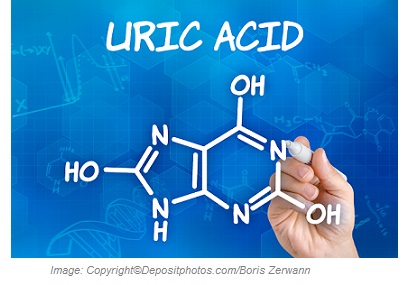 deposition of uric acid crystals in the joints. Uric acid comes from the metabolism of purines in the body. Gout is a metabolic disease characterized by recurrent acute arthritis.
deposition of uric acid crystals in the joints. Uric acid comes from the metabolism of purines in the body. Gout is a metabolic disease characterized by recurrent acute arthritis.
The big toe is the most commonly affected joint, which is called podagra. Other joints such as ankles and knees could be affected later. During a gouty attack, the joint becomes inflamed, red and swollen and painful. It is so painful that patients cannot tolerate even a sheet on it and they are unable to wear their shoes.
Chronic gout could lead to kidney stones, osteoarthritis of the joint, and tophi (painless deposition of uric acid crystals in the joints, cartilages, bones, bursas and tendons).
Gout affects men twice more than women. Most women with gouty arthritis are postmenopausal and elderly. Premenopausal gout is rarely seen.
Though a high level of uric acid in the blood increases the risk of developing gout, not all cases of gout are associated with high levels of uric acid.
Potential causes of high levels of uric acid are:
- Decreased excretion of uric acid
- Dehydration
- Dysfunction of the kidneys.
- Acidosis.
- Low function thyroid.
- Medications: diuretics, pyrazinamide, levodopa, ethambutol, niacin, cyclosporine, and low doses of salicylates (aspirin).
- Obesity.
- Increased production of uric acid
- Genetics.
- Alcohol.
- Sickle cell anemia.
- Thalassemia.
- Psoriasis.
- Diabetes.
- Polycythemia.
- Lead poisoning.
- Metabolic syndrome.
- Glycogen storage diseases.
Nutritional Supports:
Restricted Foods:
- Foods high in purines: beef, pork, chicken, turkey and fish (sardines, herring, mackerel, anchovies).
- Foods high in uridine: sugar cane, tomatoes, yeast, and broccoli. Uridine could increase blood levels of purines followed by high levels of uric acid.
- Sweetbreads (animal thymus).
- Eggs.
- Organ meats: kidneys, brains and liver.
- Seafood (shellfish, scallops, shrimps, and mussels).
- Meat broths and gravies.
- Vegetables high in purines: legumes, spinach, rhubarb, mushroom, asparagus, and cauliflower.
- Beer.
- Alcohol.
- Refined sugars.
- Saturated fats, hydrogenated fats, and Trans – fats.
- Too much protein (more than 1 gram per kilogram of body weight).
Recommended Foods:
- Water: more than 3 liters a day.
- Whole gains.
- Berries, especially strawberries and blueberries.
- Cherries.
- Flaxseeds.
- Celery seeds and celery.
- Fish (salmon, cod, and halibut).
- Lime.
- Lemon.
- Vinegar.
- Soy products.
- Dairy products (low fat).
- Coffee.
Recommended Supplements:
- Omega – 3 Fatty Acids: 2 – 3 grams a day. They reduce inflammation.
- French Maritime Pine Bark Extract: 200 – 300 mg a day. It is a powerful antioxidant that reduces inflammation and uric acid levels.
- Grape Seed Extract: 50 – 100 mg a day. It reduces inflammation.
- Folic Acid: 10 – 50 mg a day. It lowers uric acid levels.
- Vitamin C: 1000 – 2000 mg a day. This vitamin increases excretion of uric acid via urine.
- Nettle Root Extract: 500 – 1000 mg a day. This herb increases excretion of uric acid via urine.
- Celery Seed Extract (with 85% of 3nB): 150 – 225 mg a day. The active ingredient in celery seed is 3 – n – Butylphthalide, which reduces both uric acid level and inflammation.
- Quercetin: 2000 – 3000 mg a day. It is a flavonoid and powerful antioxidant that decreases uric acid level and inflammation.
- Bromelain: 1500 mg a day. It reduces inflammation.
- Cherry Fruit Extract: 2000 – 3000 mg a day. It reduces both inflammation and blood levels of uric acid.
Miscellaneous Suggestions:
- Liver detoxification.
- Colon cleansing.

